Peter MALONE
Saturday, 18 September 2021 19:21
Honey, I Blew Up the Kids
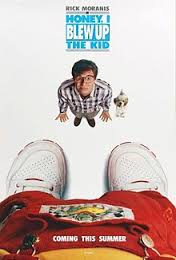
HONEY, I BLEW UP THE KIDS
US, 1992, 89 minutes, Colour.
Rick Moranis, Marcia Strassman, Lloyd Bridges, John Shea.
Directed by Randall Kleiser.
Honey, I Blew Up the Kid is the sequel to Honey, I Shrunk the Kids, the very successful 1989 Disney feature which pleased family audiences. This sequel is more of the same. Once more, Rick Moranis is the eccentric inventor who accidentally inflates his baby child. Marcia Strassman is his exasperated wife. However, there are some villains in the form of John Shea, a jealous scientist. However, all is eventually well because it is in the hands of Lloyd Bridges.
The first film was possibly more sympathetic because the children were miniaturised and it is easier to have sympathy for smaller people being terrorised rather than, as here, with a large baby who threatens everybody else. The film is reminiscent of '50s science fiction films where large creatures terrorise screaming populations running in all directions. There is plenty of that - especially with the location in the centre of Las Vegas.
The special effects are enjoyable, the giant child in the home, in the streets of Las Vegas, picking up a car as if it was a model, having his brother and the babysitter in his pocket...
The film is an easy entertaining and was directed by Randal Kleiser, best known for Grease and The Blue Lagoon. His films for Disney include The Flight of the Navigator and White Fang.
1.The audience intended? Family, children? An entertaining sequel to the popular original?
2.Nevada, Las Vegas, the desert, the laboratories? - Real enough to be believable?
3.The special effects, the fantasy? The baby growing bigger, in the house, on the streets? In Las Vegas? The musical score?
4.Wayne and his skills as an inventor, as a zany person, eccentric? The gadgets in the house, the phone on his head? His love for Diane, his children? His work at the laboratory, the jealousy of Hendricksen?
5.His daughter and her going to college? Nick and his wanting to play the guitar, the baby standing on the guitar? His job, questions about girls, attraction to Mandy, the phone call?
6.Adam as a lively baby, getting out of the playpen, mischief? His skill in talking - vocabulary, intonation!
7.The work at the laboratory, the experiments to inflate objects? Wayne wanting to go back, Nick helping? Taking the baby? Taking the big bunny? Smitty and his attentiveness at the door, getting in touch with Hendricksen? The experiment, Adam getting out of his stroller, he and the bunny being inflated? Going home, the microwave - and his growing bigger? Mayhem in the house, his being chased around the house, the variety of visual jokes? Buying the clothes, taking him back to the laboratory, pretending he was Jugoslav uncle? Taking him back home, Diane's reaction? Wayne and Diane going to the laboratory to find the miniaturiser? Their search in the warehouse? The van and its reversing, going fast, miniaturising the police? Mandy arriving as the babysitter, fainting, being tied up, screaming? The baby in front of the television - and Richard Simmons' aerobics? The waves affecting him and his growing bigger? Out of the house, the chase through the street, the children at the party at the pool? His being caught, in the vehicle, the electric wires along the highway and his being enlarged?
8.Nick and Mandy chasing Adam, his putting them in his pocket? The danger of their being crushed, airsick, in the car, perched on the sign, Adam playing and sweeping the car around like a toy? The danger of falling? Their still being miniaturised at the end - and having some time together before getting back to normal?
9.Diane and Wayne, chasing the baby? Stirling and his support - and firing Hendricksen? The chase, the ideas, going on top of the big bunny and singing "Twinkle, Twinkle Little Star," Wayne in the baby's pocket and falling down the leg of the overall? The plan with the ice cream van? Turning off the lights, the baby pursuing the van?
10.Hendricksen and the board member, their plotting? His hostility to Wayne? Getting the military, hiring the helicopter, making demands? Trying to fire at the baby? And his being punched by Diane at the end?
11.The glitter of Las Vegas, the people in the street, running hither and thither? The TV coverage and commentary? The baby walking, the games, the breaking of cars, playing with the car like a toy, following the ice cream truck? The visual jokes of the large creature on the city? The Hard Rock Cafe - and the guitar?
12.Diane and her idea to be inflated, her coming to the rescue of her little boy?
13.The happy ending, everybody back to size, Nick and Mandy romantic, Stirling giving Wayne the job? A happy ending for everyone?
Published in Movie Reviews
Published in
Movie Reviews
Tagged under
Saturday, 18 September 2021 19:21
Homeboy
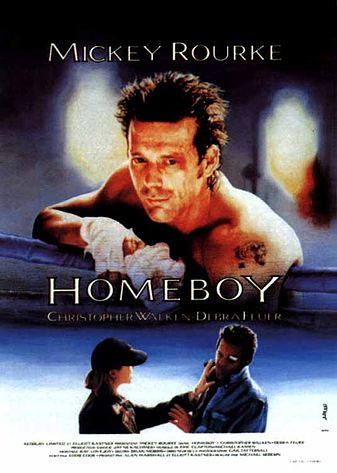
HOMEBOY
US, 1988, 118 minutes, Colour.
Mickey Rourke, Christopher Walken, Ruben Blades.
Directed by Michael Seresin.
Homeboy is a boxing melodrama which received minimal release. It has echoes of Rocky, as to most boxing films from the mid-'70s. However, it is set in a more squalid society and Mickey Rourke's Johnny is certainly not the kind of hero presented by Sylvester Stallone.
The film is a Mickey Rourke vehicle - a down and out boxer who could made something of himself in a city but gets mixed up with crooks and is suffering from brain damage. The film has a very downbeat tone. Co-starring is Christopher Walken - in a role that he does particularly well, the genial conman who really is callous, superficial and criminal.
The film was directed by director of photography (for some Alan Parker films) Michael Seresin.
No better, no worse than many other boxing films - but grim tone.
1.The popularity of boxing films? The tradition of boxing films from the downbeat films of the '40s to Rocky? The place of this film in the tradition?
2.The American city, squalid, the bars, gymnasiums and the seedy atmosphere? The contrast with the carnival and the sea? Authentic atmosphere, seedy? Musical score and songs?
3.The title and Mickey Rourke's performance? Johnny's arrival, awkward, meeting people, the bar, the boxing, his blurred vision and health? To live or to die?
4.Johnny's character: his boxing skills, not so bright in his mind, training, bouts, friends? Wesley and the build-up? Smooth talk? The visit to the doctor and Wesley concealing the truth? The robbery and Wesley wanting Johnny to be involved, be exploited? The encounter with Ruby and the ponies, the carnival, helping her, the soda, talking, the growing relationship? Love, sexual encounter? Being able to tell his story? Hearing hers? The deep sensitivity in him? The final bout, the training? His friendship with the gymnasium personnel, black and white, trainers, not exploiting him but trying to get the best out of him? Wes and the drug dealer, the girls and his distance? The fight, not wanting to do the robbery (and not knowing what Jewish meant)? The final battle in the ring, Wesley and the truth, his sitting down and losing - willing himself to die?
5.Ruby, the young woman alone at the carnival, her work with the ponies, the toughs and Johnny's intervention? Managing, toughness and niceness? Friendship with Johnny, the ability to talk, relate? At the seashore? The work on the carousel and renewing it? Watching the final fight, her sadness? The end - and the carousel going and her looking for Johnny?
6.Wes, the conman type, on parole, smooth clothes and talk, off-key singing at the strip club? Interested in the fights, befriending Johnny, adopting him? Talking, the drug-taker, arranging for the prostitutes to come in? The drug man, the planning of the robbery, the despising of the Jews? The double-dealing by the drug-taker? Johnny refusing? The deal, going to the robbery disguised as Jews, the drug man's betrayal, the chase, Wes shot?
7.The drug-taker, his needs, police informer? The beeper? With the girls? The plan, the disguise, driving off and leaving Wes?
8.The boxing fraternity, the fighters, the trainers? The bouts, the prize-fights, the referees? The response of the crowd?
9.The Rocky variation: the down and outer and the possibility of success? The variation with no hope?
10.The film as a pessimistic slice of American life?
Published in Movie Reviews
Published in
Movie Reviews
Tagged under
Saturday, 18 September 2021 19:21
Home Alone 2
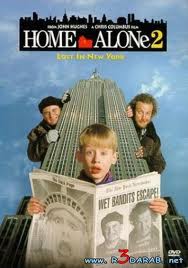
HOME ALONE 2
US, 1992, 120 minutes, Colour.
Macauley Culkin, John Heard, Catherine O'Hara, Tim Curry, Brenda Fricker, Daniel Stern, Joe Pesci, Eddie Bracken.
Directed by Chris Columbus.
Home Alone 2 is virtually a remake of the original. Home Alone was one of the most successful comedies of all time - and so the formula is repeated, this time in New York City. John Hurt and Katherine O'Hara are the parents once again. Daniel Stern and Joe Pesci are the brainless criminals - and get as much comeuppance from Kevin this time as before. Additions to the screenplay are Eddie Bracken's kind owner of the toy shop in New York City and Brenda Fricker (Oscar winner for her role as the mother in My Left Foot) as the eccentric bird lady in Central Park. Macauley Culkin draws everyone in as Kevin - though he is prone to some precocious winks and eyebrow-raising at the audience. Tim Curry has a good role as the attendant at the New York Plaza Hotel.
The film was once again written by John Hughes and directed by Chris Columbus.
1.The popularity of the original - and the need for a remake? The audience appeal - adults, children?
2.The Chicago settings, the transition to New York City - Christmas time, the Hotel Plaza, shops, Central Park, the streets and apartments? The musical score?
3.The action and slapstick sequences? Editing, stunts, timing?
4.The family, the cousins at the home, the preparation for the holiday, the antagonism amongst the children, Uncle Frank and his dominance - and the shower sequence? Kevin's parents and the frantic life? The Christmas pageant, humiliating Kevin, Buzz and his mischief, having to make apologies? Kevin standing his ground? Being sent to his room? The repeat of the previous situation, the alarm clocks and sleeping in - but Kevin in the bus for the plane?
5.The trip to the airport, going to the plane, Kevin and his batteries, seeing the same coat as his father's, making the mistake, the confusion with the boarding passes, hurrying onto the plane? In the plane - and with the French tourist? New York, the realisation of what had happened? The parents in Florida, their discussion with the police - and that they never lost their luggage, touch wood? The holiday in Florida, the rain - and watching It's a Wonderful Life in Spanish?
6.Kevin in New York, ingenuity, the exhilaration from the taxi, watching the skyline? The Hotel Plaza, using his father's credit card? The assistant and his help - but suspicion? The room and its luxury, feasting and eating, the television and the gangster film, his taping the film? His later using the tape for the suspicious attendants and getting away from them?
7.The hotel staff, their suspicions, going into Kevin's room, the slapstick comedy with the tape? The parents and their confrontation of the attendants?
8.Kevin in New York, the streets, the toy shop, the friendliness with Mr Duncan, the gifts, the gift of the birds? The happy ending with the money saved, Mr Duncan and his kindness? Toys and gifts for all the family?
9.The bird lady and his wariness of her, the pigeons, her stern look? Meeting her in Central Park, talking with her? Her protecting him against the two criminals? Going to Carnegie Hall and her favourite spot? Her giving him a lesson in how to live his life? The gift of the birds?
10.Kevin and the bandits, their getting out of jail, their stupidity, seeing him in the street, the chase - and falling with the pearls? Their planning of the robbery of the toy shop? The various pursuits of Kevin, going to the house, Kevin outwitting them? The details of all the slapstick comedy, the pratfalls, the screen violence with the comic touch?
11.The happy resolution, his mother searching for him through the New York streets, the Christmas tree, Rockefeller Centre? Going back to the hotel? The presents for everyone?
12.The reasons for the popularity of the film in the United States and worldwide?
Published in Movie Reviews
Published in
Movie Reviews
Tagged under
Saturday, 18 September 2021 19:21
Home Alone
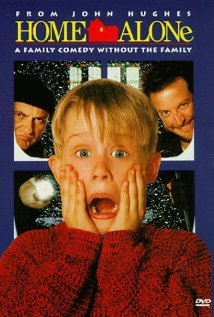
HOME ALONE
US, 1990, 103 minutes, Colour.
Macauley Culkin, John Heard, Catherine O'Hara, Joe Pesci, Daniel Stern, John Candy.
Directed by Chris Columbus.
Home Alone was an extraordinary box-office hit of Christmas 1990. It is a story for Christmas - but a story for children and for parents.
It was written and produced by John Hughes, best known in the mid-'80s for his films about adolescence, but also for his stories about families (Uncle Buck). In this film he combines his humour about children with his humour about vacations and the hazards of travel (he was the author of the National Lampoon Vacation screenplays as well as his Planes, Trains and Automobiles). Home Alone is a combination of Uncle Buck and Planes and Trains with some daffy burglars thrown in for good measure.
Macauley Culkin (the young nephew of Uncle Buck) plays Kevin, the eight-year-old who is inadvertently left behind when the family goes to Paris on holidays. He manages alone - especially with two odd robbers, Joe Pesci and Daniel Stern, and vanquishes them. While the film pokes fun at thrillers, it also highlights Kevin and his using his wits and strength.
The film is amusing - and the sequences with the robbers are enjoyable. The cast includes John Hurt and Katherine O'Hara as Kevin's parents, Roberts Blossom as a seemingly sinister neighbour, and a guest spot from John Candy.
The film was directed by writer-director Chris Columbus (Young Sherlock Holmes, Heartbreak Hotel, Mrs Doubtfire, Stepmom). But this film is reminiscent of his very enjoyable adventures in babysitting (A Night on the Town).
1.Popular holiday film? Christmas? A film for the family? For American audiences? World-wide?
2.Chicago, the affluent white neighbourhood? Locations, special effects and stunts?
3.The musical score, the range of Christmas songs, the message and the feeling?
4.The title, sinister, the little boy alone, fear, having to cope? His relationship with family?
5.The opening with the family, the crowd, the carry-on, the shouting, the children and the cousins, aunt and uncle? Arguments, everybody down on Kevin? The policeman at the front door? The pizza boy, the mess at the meal, Kevin being blamed, his mother taking him upstairs, Kevin forgotten?
6.The night, the storm, the clocks stopping, the plans for getting to the airport, the hurry, the counting of heads and the neighbourhood boy there? The running at the airport, the flight, the relaxation, the horror of the discovery that Kevin was missing? Crisis, the phone calls, the police looking at the home? The Paris holiday spoilt? Mother and her staying at the airport, begging the American couple and trying to pay them off for the ticket? Landing in Scranton, her planes and trains exasperation, the meeting with Gus, his explanation of his background, offering her a lift?
7.Kevin and his age, place in the family, being picked on? His being hurt, put in the attic? Waking up, searching the house, the memory that he had wished his family would disappear? His day at home, eating, making a mess, watching the television? The junk gangster movie? Going into Buzz's room and creating havoc, the money? Afraid in the basement? Going out, seeing the robbers - and remembering the gold tooth? Playing the TV gangster film to frighten away the robbers, to frighten away the pizza boy? Going shopping, the toothbrush, his being chased as a shoplifter? His going to the market, buying everything competently? The questioning girl at the checkout, everything dropping out of the bags?
8.Overhearing the robbers' plan, his fears, going past the church, the crib, going in? The background of Marley and everybody thinking he was a murderer hiding in the neighbourhood? Frightened of him in the shop and running away, frightened of him in the church? Marley sitting next to him, their talking, each telling their story? Marley's good advice? His advice to Marley about reconciliation with his family? 9 o'clock, his preparations for the robbers - oil on the stairs, the hot doorknob, the fire? The robbers' arrival, the attack on the house, their confidence? But inept? Their slipping, banging their heads, on fire? Their feet, the paint tins, tripping? Trying to follow Kevin to the tree house and his cutting the rope? Kevin shrewdly phoning the police? Going into the neighbour's house, the water? Kevin being caught, hung on the door, saved by Marley?
9.The comic robbers, inept, masquerading as police, their truck, stalking the neighbourhood, the robbery in the Murphys', leaving the water running, making messes? Scared by the television movie? Seeing Kevin? The return, the knockabout comedy sequences, being caught?
10.Marley, sweeping the snow, the stories about him, Kevin's fear in the shop, the church, as a lonely old man, his clash with his son, going to hear his granddaughter sing, saving Kevin at the end, the glimpse of reconciliation with the family - Christmas sentiment?
11.Kevin's parents, the messy household, mother and her putting Kevin in the attic, the hurried departure, rushing at the airport, planes and trains? Frantic in Paris, her return, meeting Gus? Talking with him about being a good parent? The family all arriving at the end? The sketch of the brothers and sisters - especially Buzz and his pushing Kevin around - and the final line?
12.Portrait of a little boy, eight, his fears, handling the situation, the change and its effect on him?
Published in Movie Reviews
Published in
Movie Reviews
Tagged under
Saturday, 18 September 2021 19:21
Homeward Bound: The Incredible Journey
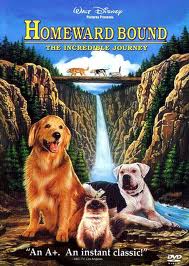
HOMEWARD BOUND: THE INCREDIBLE JOURNEY
US, 1993, 84 minutes, Colour.
Robert Hays, Kim Griest. Voices of Michael J. Fox, Don Ameche, Sally Field.
Directed by DuWayne? Dunham.
Homeward Bound: The Incredible Journey is an entertaining family film from the Disney Studios. Reminiscent of so many of the animal features of the '50s and '60s, the film focuses on a family and its pets, the family having to go to the city, the pets being put out for care but feeling abandoned and trying to wend their way back home.
The film has the attraction of north-western United States mountain scenery, but its main attraction is in the animals. However, the animals are not just themselves but are given human voices - star voices with that of Michael J. Fox as the young dog, Don Ameche as the elderly dog and Sally Field as the cat. The voices are so persuasive that one finds oneself thinking that the animals are actually speaking! Entertaining for the adults because of the voice characterisations, entertaining for children with the focus on the animals.
1.Popular family entertainment? For all ages?
2.The appeal of the animals, of dogs, of cats? The tradition of the movies about animals? The significance of the voices, the characterisations, giving human feelings, sentiments and words to the animals?
3.The American north-west, the rugged mountains, the beauty of the mountains, the animals?
4.The stars and their voices, the emotional effect, comic effect?
5.The situation at home, the young dog and his telling his story, an orphan, suspicious? In the home, wary of the children and their abandoning him? The relationship with the wise old dog, with the cat? The portrait of the children, their mother and the relationships, the stepfather and his having to go to the city? The situation of leaving the animals behind?
6.The portrait of the human family, parents and their concern, the children, not wanting to move, their over-emotional reactions, bad manners? In the city, the news of the lost animals, their reactions? Hostility to the stepfather? The stepfather and his work at the university, the computer printout, discussions with the police, the search? The growing bonds with the children? Finding the animals and the happy reunion?
7.The animals delivered to the farm, the horses, the supervisor and her care? Her leaving the note? The horse trainer and his misunderstanding the note?
8.The police, their concern, dealing with the children, helping the search?
9.The animals and their feeling abandoned, their perspective, ways of talking, their fear, relating as a group?
10.The old dog leading the animals back, the experience of dangers, the terrain, hunted, the wild animals - and the young dog and the tricks? The cat, her drowning - but surviving? Found by the old-timer and cared for?
11.The hardships of the journey, the finding of food, the need for rest, the use of instinct?
12.The courage of the journey, the struggles, finding the city, returning home? Getting through the town itself, the dangers from trains and vehicles? The happy reunion?
13.The basic story and its universal appeal, animals, human values?
Published in Movie Reviews
Published in
Movie Reviews
Tagged under
Saturday, 18 September 2021 19:21
Won Ton Ton,The Dog That Saved Hollywood
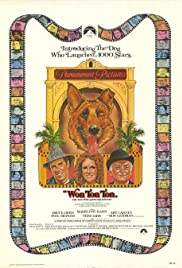
WON TON TON - THE DOG THAT SAVED HOLLYWOOD
US, 1975, 92 minutes, Colour.
Bruce Dern, Madeline Kahn, Art Carney, Ron Leibman, Denis Morgan, Teri Garr, Sterling Holloway, William Demarest, Virginia Mayo, Rhonda Fleming, Rory Calhoun, Ricardo Montalban, Jackie Coogan, Johnny Weismuller, Aldo Ray, Ethel Merman, Yvonne de Carlo, Joan Blondell, Broderick Crawford, Richard Arlen, Dorothy Lamour, Phil Silvers, Alice Faye, Nancy Walker, Stepin Fetchitt, Gloria De Haven, Rudy Vallee, George Jessell, Ann Miller, Dean Stockwell, Dick Haymes, Tab Hunter, Robert Alda, Ritz Brothers, Victor Mature, Fernando Lamas, Zsa Zsa Gabor, Cyd Charisse, Peter Lawford, Guy Madison, Ann Rutherford, Milton Berle, John Carradine, Walter Pidgeon.
Directed by Michael Winner.
Won Ton Ton - The Dog That Saved Hollywood had many funny moments and lines (none brilliant), an excellent performance by the expertly versatile comedienne, Madeline Kahn, some satire on Hollywood, its types and its phoney values, and an underlying theme of the precariousness of stardom. In fact, via Won Ton Ton (alias Rin Tin Tin), the screenplay parodies Hollywood plots, especially the rise, decline and fall of an actor. Won, with the alcoholics in the street, attempting suicide, makes us realise the real pathos of ephemeral celebrity. (Which makes one wonder why a score of veterans have appeared, many momentarily, in this film.) While entertaining, a comparison with, say, Silent Movie, shows it should have been better.
1. The significance of the title, the reference to the dog and the parody of Rin Tin Tin, the emphasis on Hollywood and the background of the film about the studio needing to be saved? How enjoyable a comedy? How enjoyable a parody of Hollywood, Hollywood films, the biographies of stars? Was there more in the film than the surface comedy and parody?
2. The re-creation of Hollywood in the 20's, the suburb itself and the city, people searching for work, talent, ambitions? The presentation of the studios, the chiefs, the atmosphere of fantasy in film-making, the technical side of making silent films? The presentation of the Hollywood way of life and all that that means?
3. How did the film rely on comedy set pieces: of the identity of the dog, of the identity of the stars, car chases and crashes, slapstick details etc.?
4. How enjoyable was the parody of Rin Tin Tin? The importance of the detailed parallel of the rise of the dog as a star to the rise of the human star, success and failure? The details of the dog at the height of his success, wandering the streets, the alcoholics, suicide, rejection and the final happy ending? How much insight into the fragility of the success of a film star?
5. The presentation of won Ton Ton as a dog, his saving qualities and the hero aspect of his stardom? The pictures in which he acted, the presentation of silent films and their style? The conventions of directors, stars, technicians, the atmosphere of the studio and the dog fitting into this?
6. The film relied a lot on guest stars in very small spots. What did this contribute to the film? The value of the audience trying to spot the ageing film star? The comment on Hollywood by presenting so many of the older stars in this way? A tribute, satire?
7. Comment on the presentation of the nastier side of Hollywood, overwhelming ambitions, the careers, the cut-throat competition, starving? Estie and her being victimised by Hollywood? The studio chiefs? Grayson and his manipulating? How ugly was the picture of Hollywood?
8. The alternate focus of the film from Won Ton Ton to Estie Del Ruth? The quality of Madeline Kahn and her comic performance, how well delineated was her character, the Hollywood type hoping for stardom, her starving, the detailing of her hopes, the way that she was used, her training of the dog, her being the heroine for Won Ton Ton and the various ways in which he rescued her, especially at the beginning with the studio hands? Her wanting her own career? The humorous side of the build-up of her own career via the poor film on Custer? Her love for Won Ton Ton and devotion to him, the search and the happy ending? How clever was the gentle parody in the presentation of Estie?
9. The contrast with Grayson as the hero? As seeing him guiding the tours, driving the bus, the humorous parodies of his ideas for films in the 20s which were successes in the 70s? The American push, his using of Estie and Won Ton Ton? His lies and his manipulation? And yet his being the hero for this film? His love for Estie, the clashes with J.J. Fronberg? His final giving up of all Hollywood atmosphere? A good delineation of a Hollywood type?
10. The satire in the presentation of J.J. Fromberg, Art Carney and his depiction of the studio boss, his harshness and ruthlessness, success, being deceived by his own ambitions? Representing Hollywood?
11. How suitable was the satire of Valentino in the character of Rudy Montague? His personal style, the scene where he went to the theatre in drag and all the preparations for this, his reactions to his own films? His vanity and petulance, his attitude towards his career, his agreeing to be in the picture with the dog and Estie? His dismal failure? The irony of his handling of the press interview? How harsh was the satire on this kind of Hollywood star?
12. Professor Quicksand as a conventional villain for this kind of melodrama? The presentation of his cruelty and harshness, the irony of his cruelty to Won Ton Ton? The presentation of his shows, the inevitability of Won Ton Ton being sent away and escaping?
13. The big build-up of the search for the dog, the use of the media, the sensationalism, the various claimants to finding the dog? How enjoyable and accurate was the parody of the search and the people involved in the search, the claimants? The contrast with the almost trite ending on the seashore with the real dog and the uniting of all parties? Was that ending appropriate for this kind of film?
14. The film relied a lot on the impact of its incidentals. What did they contribute: the tours, Grayson and his selling of the bus, the sneak previews, the presentation of the columnists and their questions. the stagehands and their observations, the details of the silent filmmaking, cowboy heroes, gatekeepers, butlers and cleaners, Joan Blondell and the ironic line about Marilyn Monroe as Norma Jean, the dancing black butler, autographs, J.J. Fromberg and his succession of girlfriends, the detailed parody of the Academy Awards and the giving out. the envelopes the stars expecting and Won Ton Ton winning, Victor Mature and the Mafia, The Godfather theme, Mexican pornography, drunks, slapstick comedy?
15. How valuable a contribution to insight of the American movie world?
Published in Movie Reviews
Published in
Movie Reviews
Tagged under
Saturday, 18 September 2021 19:21
High Spirits
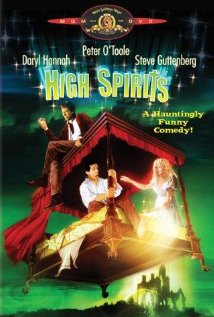
HIGH SPIRITS
Ireland, 1988, 97 minutes, Colour.
Peter O'Toole, Daryl Hannah, Steve Guttenberg, Beverley D'Angelo, Liam Neeson, Peter Gallagher, Jennifer Tilly, Ray Mc Anally, Liz Smith, Connie Booth, Donal Mc Cann.
Directed by Neil Jordan.
High Spirits is an English ghost story, written and directed by Neil Jordan, the serious maker of Angel, Company of Wolves, Mona Lisa, The Crying Game, Michael Collins, The Butcher Boy. This is a pity. While Jordan might have made a funny film, he has had only moderate success. It has the old ghost story ingredients, like The Ghost Goes West, The Canterville Ghost, Happy Ever After - impoverished Irish, servants impersonating ghosts to impress Yankee visitors, real ghosts with histories. But it needs a much lighter touch for the whimsy. There is too much that is crass, apparently due to the producers rather than to Neil Jordan.. Peter O'Toole is quite rhetorical, the American cast including Steve Guttenberg and Beverly D'Angelo tends to shout. But Daryl Hannah is quite a charming ghost. A piece of blarney.
1.Irish comedy? Ghosts?
2.The picture of the castle, exteriors and interiors, comic pace and editing, the ghosts and the special effects, the score?
3.The title and tone?
4.Peter O'Toole as Peter Plunkett, the owner of the castle, his rhetorical utterances, his gestures of suicide, Brogan and the Americans wanting the castle, his relationship with his mother, the idea of the ghosts?
5.The rehearsal and the detail, the set-up for the hauntings? The Americans' arrival? The bus, the guide, the banshee on the roof, the accidents, going into the lake, fiasco? The welcome?
6.The meal and the whiting, trying to scare the guests before bed? The various ghosts and performances? The revolving bed? The fiasco and Plunkett's explanation to the guests?
7.Jack and Sharon, the journey together, the plane trip, Sharon and her bitchiness, not enjoying things? Jack and his enjoyment? The ghost detector and his family? The young girl on tour, the story of her life and men, Father Tony and his going to test out his religious commitment in Ireland?
8.Mary and Martin, the story of the ghosts, their re-enacting the murder every night? Jack and Plunkett talking, Jack seeing the ghost, intervening, being stabbed, for love of Mary, breaking the pattern? The clashes with Sharon? Her ringing her father? The appearances of Mary, Jack discussing the situation with Plunkett's mother? Halloween, Martin seeing Sharon, pursuing her? The sexual encounter between Mary and Jack, her ageing 200 years? Martin and the bus, the pursuit of Sharon, Sharon embracing him and falling and dying? Mary in her body? The two couples, the dance and the happy ending?
9.Plunkett, his rhetoric, his drinking, suicide attempts, Halloween, the happy ending?
10.The guests, the Halloween party, the bus chasing them, the girl and Tony, falling into the moat, falling in love?
11.The staff, their loyalty to Plunkett, the performances as ghosts, failures and success?
12.Plunkett's father as a ghost, his mother, the marriage between humans and ghosts?
13.The special effects for the ghosts, the stunts, the bus, people losing their clothes, the wraiths flying about? Irish jokes? A piece of blarney?
Published in Movie Reviews
Published in
Movie Reviews
Tagged under
Saturday, 18 September 2021 19:21
Hector's Bunyip
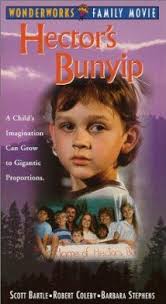
HECTOR'S BUNYIP
Australia, 1985, 82 minutes, Colour.
Robert Coleby, Barbara Stephens, Gordon Piper.
Directed by Mark Callan.
Hector's Bunyip is a children's telemovie, designed for children to enjoy - but with touches of interest and humour for parents.
The film focuses on an eccentric husband and wife who have their own children and have adopted three (ranging from Asian to aboriginal to physically handicapped). There are tensions in the town - especially with a money man interested in development. There is parody of Australia's American preoccupation with theme parks in the presentation of the money man trying to build tourism in the small town because of the bunyip that the handicapped boy has as his imaginary companion.
The hero of the film (Robert Coleby) is called George Bailey (James Stewart's name in Capra's It's a Wonderful Life). He and his wife have given Greek mythical names to their children (which he mixes up) and there is a lot of family storytelling and imagination. The film pokes fun at social welfare do-gooders as well as the money dealers. Terry Willesee appears with the Channel 7 news team (Seven had money in the project) and they are not particularly satirised although there is some spoof on the media.
The film is set in Western Australia, shows the power of imagination and storytelling - and has a strong message about family, family unity with overtones of anti-prejudice towards Asians and aborigines.
1.Entertaining family film? Children's audiences? Adults?
2.The Western Australian settings, the small town, the bush? The Bailey household, the inventions - turning into modern art? The development of the town for tourists? The musical score?
3.The title, the focus on the young boy, imagination, the Australian creature as the imaginary companion?
4.The presentation of the Bailey family: George, his inventions, forgetfulness? Love for the children? The family sequences, meals, telling stories? Irene as practical and giving her support to her husband? Their natural children, the bonds between the children, their helping one another? The Greek mythical names and storytelling? Playing together? Their life in the household? The adopted children, the range of their backgrounds? Part of the family?
5.The opening, Slater's son and their frightening him in the cemetery? Slater and his anger? Slater and his place in the town, money, deals, the developers? Double-dealing? His meetings, the pressure on the family? His visits, wanting to evict them? Getting the authorities in? The collaboration with Miss Trumball? The possibility of the bunyip park, the hotel developments, his ambitions? The tourists coming in? The media? His self-importance? Change of heart towards the family? The revealing of the truth, his comeuppance and humiliation? His son? The caricature in his performance?
6.Miss Trumball, the elderly unmarried woman, her severity, visiting the family, her criticisms? Her hard line? Wanting to catch the family out? Camping? The rain? Her coming into the family, the storytelling, her opting out? The gradual mellowing? Her change of heart? Joining in the family, becoming the aunt?
7.The humorous background of Ivy, Piper and Chooka, comic characters, the bananas, the banana chip plan? Inventions? With the children, with the family? The bunyip, the tourists? The humorous mix-ups?
8.The media, Terry Willesee as himself, the interviews, the coverage? People's reaction?
9.The tourists and their coming in, the eccentricities of tourists, curiosity, commercial? All wanting to see the bunyip? The gentle spoof on tourism, theme parks, the behaviour of tourists?
10.The portrait of the children: Pandora and Gilbert, their responsibilities, helping one another? Cassandra and Heracles? Lim and his Asian background, Michael and the aborigines? Hector and his disability? His getting lost, imagining the bunyip? The family and their support of the bunyip? Miss Trumball and her wanting to take him away, the children hiding him in the cave, giving him food? Trying to find him? His re-emergence, the success of the bunyip? The bunyip finally leaving?
11.The police, the young inspector, his dating Pandora? His disguise, warnings, helping out the family?
12.The signwriter - and the humour about the signs, his contribution?
13.The optimistic family? Good nature? Family love? The poking fun at money and the social system and its legalism?
Published in Movie Reviews
Published in
Movie Reviews
Tagged under
Saturday, 18 September 2021 19:21
Heaven Tonight
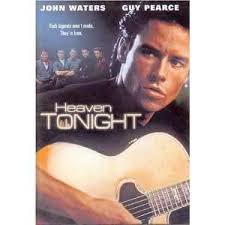
HEAVEN TONIGHT
Australia, 1990, 95 minutes, Colour.
John Waters, Guy Pearce, Rebecca Gilling, Sean Scully, Kym Gyngell.
Directed by Pino Amenta.
Heaven Tonight is set in the rock world of the late '80s. It is a familiar story of the generation gap, the father a musician of the late '60s, early '70s who has not been able to give up his dreams - having had 18 months' success. His son seems a natural as a musician and is bound for glory.
While the material is familiar, the intensity of the performances give it great strength. John Waters acts with his customary brooding intensity (as in Boulevard of Broken Dreams). Rebecca Gilling is attractive as his supportive wife. Kym Gyngell is effective in an offbeat character role of a musician who is bent on self-destruction. The supporting cast includes Sean Scully. Guy Pearce appears as the son - but his role is underwritten so that he does not make such a strong impact.
The film was produced by Boulevard Films, a company very busy in the late '80s with a great number of features including Boulevard of Broken Dreams, What the Moon Saw, Hunting, Flynn. The film was directed by Pino Amenta who also directed Boulevard of Broken Dreams.
1.A local story? The generation gap? The music world?
2.The Melbourne settings, the atmosphere of the city? The period re-created with newsreel footage? The contrast between the '60s and the '80s?
3.The musical score, the title song, the sound of the '60s and '70s, the sound of the '80s? The range of songs?
4.The introduction, the newsreel footage of events of the '60s and '70s? The music of the period? Manner, style, clothes, hair etc? The newspaper headlines and the photos, Johnny Dysart's career, the breaking up of the group?
5.John Waters as Johnny Dysart: in the initial excerpts, the success, the band, the members of the band, his marriage and son, drugs, the break-up of the band? In the late '80s, exercise and trying to keep fit? His love for music? His easy relationship with his wife, supported by her? Difficulties in communicating with his son? The clash with Tim Robbins, sending him the tape, receiving the Christmas card? Ambitions for a deal, money for a holiday? The various gigs, his performance, people leaving the group, his friends and their older appearance? Playing in the pub, support of his wife, the cat-callers calling him `ancient history'? Bas arriving, their talking, reminiscing? Bas's downfall? His hopes, lecturing Paul about the music business? Thinking the younger generation had no heart? His going for the job, the interview, being recognised? The mistake about the interview with Tim Robbins? The angry confrontation with Tim, his drinking, the return home, blaming Annie, hitting her? Going to see Bas, looking at him in the movies, Bas cutting his hand, the police raid, running away, the hot dog, the hold-up, the confrontation, talking about the death wish, the police and Bas's death? The funeral and its effect on him? Blaming himself - and watching the boxer on the television talking about defeat and losing skills? Reconciliation with his wife, her work for the Japanese restaurateur, the decision to go into the restaurant business? Going to his son's performance, Paul's acknowledging him on stage and the applause? The new generation singing `Heaven Tonight'? The generation gap, the age gap, the conservative holding on to the security of something well-known and successful, refusing to blame self? Portrait of a middle-aged man and burnout?
6.Bas, seeing him in the newsreel clips, the drug background, separation from the band, reappearance, the phone call to Annie, seeing Johnny in the street, talking, watching the home movies, shared memories? Bas as a failure, his attitudes towards his own songs, killing himself with drugs, collapsed, cutting his hand, sleeping, feeling sorry for himself, the police raid, the gun, the thrill of the hold-up, the chase, getting to the top for a short moment, ready to die, being shot? The funeral and the clergyman referring to his talent and as `resting in the arms of the Lord'?
7.Tim, place in the band, getting out, business success, listening to tapes, his office and secretarial staff, colleagues, meeting Johnny, sending him the card, the mistake about the interview, the decision to confront Johnny with the truth, the funeral and offering him a job, supporting Paul? Did he sell out or was it a correct reading of the signs of the times?
8.Annie and her love for her husband, the marriage, Paul, seeing themselves as young in the home movies? Her love for Johnny, going to the pub to listen to him, her work for the Japanese restaurant, the opportunity to buy it, allowing Johnny to have his way? Urging him to communicate with Paul? Her relationship with her son, understanding, support? At home for the two of them? Excitement about the interview, Johnny and his collapse, destroying his room, his anger, taking it out on her, slapping her? Her support for him, despite everything? The police, Paul going to search for him? The funeral? The future and the restaurant?
9.Paul, the younger generation, quiet, taciturn? The success with his group? The sound of the '80s, synthesised music? Admiration for his father, playing his tunes? Inability to communicate, tension at meals, in his room, his father lecturing him, him finding it impossible to apologise? His declaration of love for his father and yet his exasperated anger? The possibility of a contract? Looking for his father at the end? Success and being introduced to the public?
10.The police, the hold-ups for drugs, the toy guns, danger on the streets, the violence?
11.How credible the story? The portrait of rock stars and their fading out? The need to adapt? Family support? Money deals? Big business? The optimism of the ending?
Published in Movie Reviews
Published in
Movie Reviews
Tagged under
Saturday, 18 September 2021 19:21
Happy Together
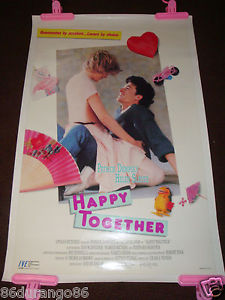
HAPPY TOGETHER
US, 1989, 102 minutes, Colour.
Helen Slater, Patrick Dempsey, Brad Pitt.
Directed by Mel Damski.
Happy Together is a slight, cheerful, predictable college comedy directed by Mel Damski, best known for a range of telemovies but whose features also include the comedy, Yellowbeard. Audience response will depend on liking for the two stars, Patrick Dempsey (The Woo Woo Kid, Can't Buy Me Love, Run, Mobsters) and Helen Slater (Supergirl, Ruthless People, Legend of Billie Jean, City Slickers). It is one of Brad Pitt's earliest roles indicating that he worked his way up to stardom.
Dempsey is an intensely serious young man, bent on being a writer, who discovers that his untidy and imposing roommate is not a man but Alex, Helen Slater. She, on the other hand, is rich and the life of the party, intending to be an actress. Inevitably they clash. Inevitably they fall in love. Inevitably they clash again and there have to be resolutions for a happy ending.
Both the stars perform competently, there is a range of teachers, fellow students - especially an obese student called Stanley who has an inflated doll, but who, somehow or other, with a talk from Dempsey, comes to his senses. A take it or leave it comedy.
1.American college life? Relationship between young men and women? Education? Hopes for the future? Serious? Comic?
2.The college campus, the buildings, rooms, shower blocks, lecture rooms, theatres? Familiar locations for this kind of comedy? The musical score?
3.The title, the title song - and the familiar words of `Happy Together'?
4.Chris, his mother pampering him, leaving home, the bus ride and his growing in independence? At college, seeking the way, reaction to the girls? Serious? His reaction to his occupied room? Not seeing Alex? In class - and her performance to get attention? Her arrival with the fellow student? Finding her, the clashes and arguments? The interactions, his exasperation with her, her over-the-top behaviour? The discussions, the shared plans? Working together, acting together? The scene where they declare that they could love each other? His reaction to her relationship with men? Slash and his proposal? Her waking him up, discussing things, his practical suggestions? Her admiration for him? The eventual falling in love? The affair? The effect on each? His complaining for a change of roommate - and the eventual roommate coming, his pretending to be gay, dressing in the dress? The lyrical scenes of Chris and Alex together? His wanting a more permanent relationship, dependence? Her flirting, the kisses to raise money? The revealing dress and his wanting her to change it? Their falling out? Confrontations? The madcap finale? His rescuing her? His return? Her admitting the truth and her dependence, his opening out? A future together?
5.Alex, seeing her on the float, her way of filling in the form, disregard of conventions? Her wealthy background? Ignoring Chris? Her boyfriends? The clashes with Chris, then relying on his advice? The dates, ringing up and changing? Her date with Slash and the promise to marry? Her performance and drawing attention to herself? The drama teacher's comment about her surface performance? Her trying to gain experience, depth her emotions? In love with Chris, the affair? The effect on her? Her racing around, the dress, the kissing to raise money? The clash with Chris and his not able to cope? Slash's return? The fight? His being called up, the alternatives about repeating the course or leaving? Alex and Chris telling the truth to each other? Their weaknesses, facing up to the truth? A future together?
6.Stanley and his inflatable doll? Sexist jokes? The talk with Chris, honest, giving up the doll? Dating the girls? Chris and his scene with the doll - and his exasperation? Stanley as a friend?
7.The range of college students meeting Alex, dates? Slash and his group, his boyfriend? His return and the confrontation?
8.The staff, the exasperated woman at the desk? The drama teacher and her advice to Alex? The writing teacher and his discussions with Chris, wanting him to feel some passion, supporting him on the board? The discussion at the bar?
9.Familiar college comedies with the serious touch, especially about relationships?
Published in Movie Reviews
Published in
Movie Reviews
Tagged under